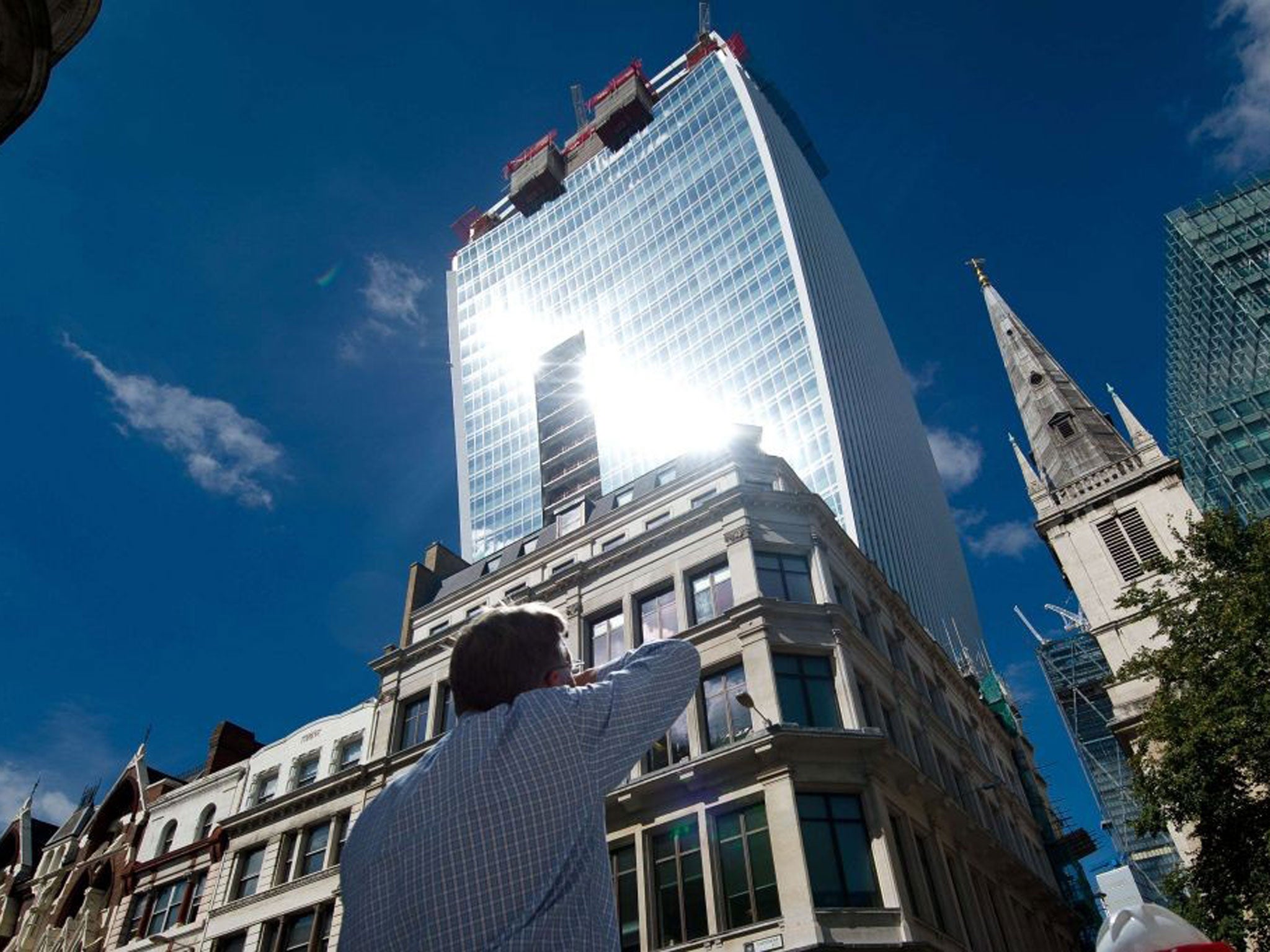Walkie Talkie City skyscraper renamed Walkie Scorchie after beam of light melts Jaguar car parked beneath it
Developers have promised urgent action to “cover up” the Walkie Talkie skyscraper in the City after an ultra-bright light reflected from the building melted a Jaguar car on the streets below.
The 525ft, £200 million building has been renamed the “Walkie Scorchie” after its distinctive concave surfaces reflected a dazzling beam of light which blinded passers-by and has now caused extensive damage to vehicles parked beneath it.
Martin Lindsay, director of a tiling company, left his Jaguar XJ for one hour opposite the building, and returned to find warped panels along its side, accompanied by a smell of burning plastic.
“They’re going to have to think of something. I’m gutted,” he told City A.M. “How can they let this continue?”
Eddie Cannon, a heating and air conditioning engineer, said his Vauxhall Vevaro had suffered similar damage: “The van looks a total mess – every bit of plastic on the left hand side and everything on the dashboard has melted, including a bottle of Lucozade that looks like it has been baked. When I got in the van it was a really strange light - like it was illuminated and they were filming.”
Passers-by have been forced to avert their eyes from blinding rays emitted from glass windows recently installed on the south side of the 37-storey building.
Designed by Uruguayan architect Rafael Viñoly, 20 Fenchurch Street, due to be completed in 2014, has been created so that its floor plates widen at the top of building, which houses a publicly-accessible Skygarden observation deck.

David Banks, a PR consultant who felt the force of the intense beam, said: “It is like a huge lens. It is magnifying the sunbeam. It’s like trying to fry ants with a magnifying glass.”
He added: “It was uncomfortable to be underneath and I was conscious that it was probably unsafe to spend too long under that particular beam.” Mr Banks expressed concern that the blinding rays could impair motorists’ vision.
Joint developers Land Securities and Canary Wharf said they are looking into the incident. In statement they said: “As a precautionary measure, the City of London has agreed to suspend three parking bays in the area which may be affected.”
A spokesman added: “The developers are on the site. It’s their priority to find out more and see what kind of solution can be out into place.”
Royal Sun Alliance are among the tenants who have signed leases for the building, in the heart of the City’s insurance district, ahead of its completion.
Whilst vertical louvers provide sun shading on the building’s east and west elevations, following the fanning form and organic curves of the building, the north and south elevations feature extensive glazing to maximize views.
Rafael Viñoly said he designed 20 Fenchurch Street “to respect the city’s historic character, following the contour of the river and the medieval streets that bound the site, while further contributing to the evolution of the high-rise building type.”
A joint statement from Land Securities and Canary Wharf read: “We are taking the issue of light reflecting from 20 Fenchurch Street seriously, and are looking into the matter as a priority.
“The phenomenon is caused by the current elevation of the sun in the sky. It currently lasts for approximately 2 hours per day, with initial modelling suggesting that it will be present for approximately 2-3 weeks.
“As responsible developers we are making every effort to keep local businesses informed and we have communicated with them regularly since the issue first appeared. While we investigate the situation further we have liaised with the City of London to suspend three parking bays in the area which may be affected.
“In addition, we are consulting with local businesses and the City to address the issue in the short-term, while also evaluating longer-term solutions to ensure the issue cannot recur in future.”
Join our commenting forum
Join thought-provoking conversations, follow other Independent readers and see their replies
Comments
Bookmark popover
Removed from bookmarks